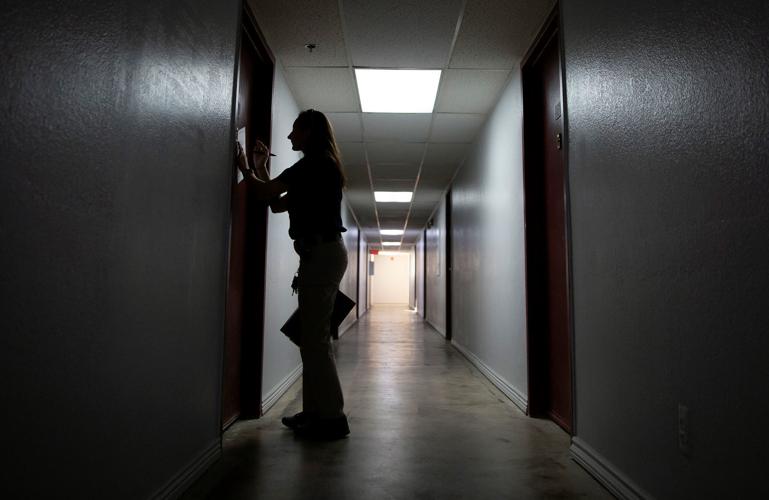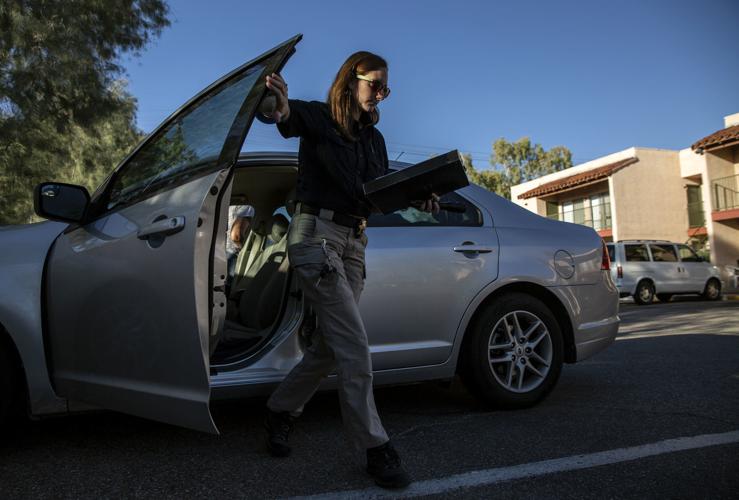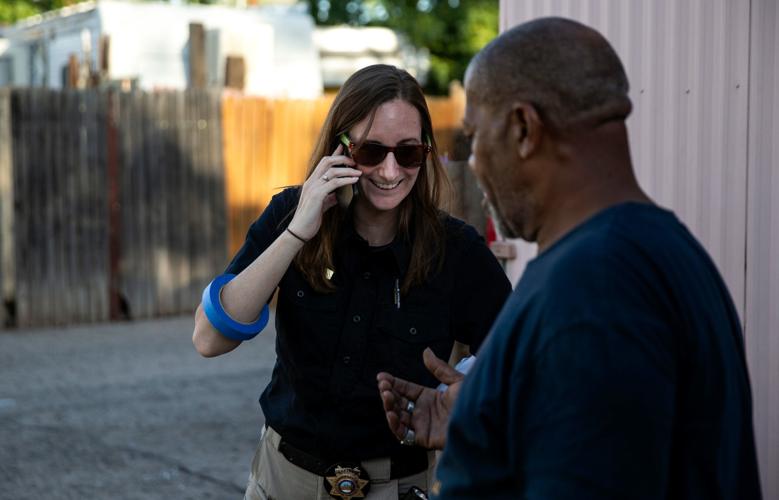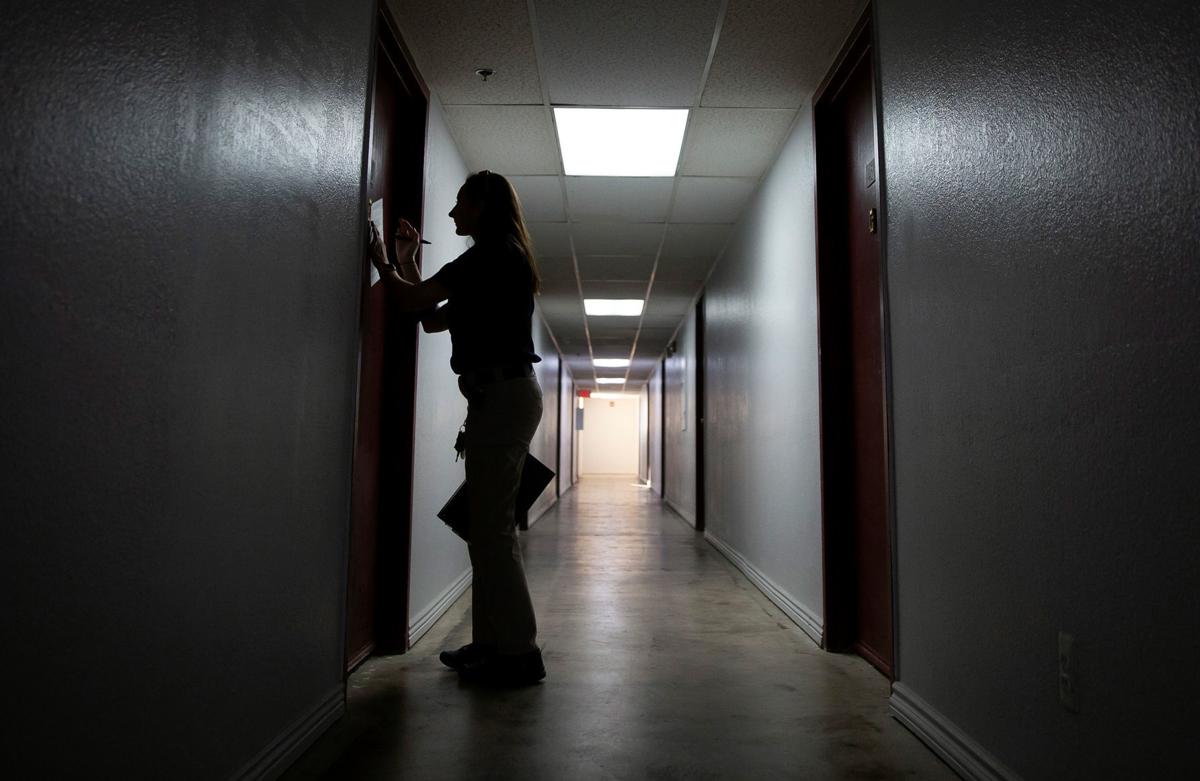Sometimes there’s just 15 minutes until homelessness.
That’s the amount of time Pima County residents who are being evicted have to gather some things and sort out what to do next.
Preventing that mad rush is behind a new pilot program that constables in two of the county’s busiest precincts started trying out last week.
So far this year, roughly 13,000 county residents have been court-ordered to leave their houses, apartments or trailers for failing to pay rent, with an average of 100 cases being processed daily at Pima County Justice Court.
People get evicted for a variety of reasons, and many of those who are not, live constantly on the brink of it.
Of the poor renter households in Tucson earning between 50% and 100% of the federal poverty level, 92.5% lived in a way that was not sustainable including spending more than 30% of their income on housing costs, a 2018 University of Arizona survey found.
Tenants facing eviction only show up for the hearings about 10% of the time. The reasons, according to people who work these cases, include lack of childcare, transportation or understanding of the process. Sometimes they can’t miss work while other times their lives are unmanageable because of drug or alcohol addiction, or unaddressed mental health challenges.
Whatever the reasons, it’s right at this moment that two local constables, Bennett Bernal and Kristen Randall, are hoping to bring about what Randall calls “a small difference.”
Here’s how: Since many people don’t realize how quickly they can be evicted — it’s often just five days after the court hearing and then within 15 minutes of the constable’s arrival — they are shocked and unprepared when it occurs.
The court documents from the hearing they missed offer some of these details, but since the court mails them out, the documents often arrive after the person or family has already been evicted.
And so what Bernal and Randall are doing is helping the tenants by hand-delivering the documents, called minute entries, so people have a little more time to decide what to do next. The constables also provide information about shelters and services as well as paperwork about a relatively new county grant that could help residents who qualify avoid an eviction.
Some of the people Randall has evicted under court order in midtown’s busy Precinct 8 have special needs or are elderly or have children, all factors that are hard to manage in 15 minutes.
Some don’t have transportation, she said, and so they are left standing on the sidewalk with a few bags, searching for a ride.
“I want to get things in place so if and when the eviction happens,” Randall says, “we’re not just going around and throwing people out.”

Pima County Constable Kristen Randall gets out of her car at an apartment complex where she tries to give a few days’ warning about a possible eviction. The county is starting a program that includes constables bringing the minutes of eviction hearings to residents.
Substance abuse, mental issues
County and state employees, as well as caseworkers and members of local social service agencies, met here last week to talk about ways to prevent evictions.
It’s an ongoing conversation with no easy answers.
The most common theme: People are being evicted because their lives are chaotic due to substance abuse and untreated mental illnesses.
“We have to focus on the bigger issues if we are really going to make a difference,” Constable Bernal said at Wednesday’s meeting. His work includes the North Oracle Road corridor and some distressed areas in the ZIP code area 85705. “Rarely do I go to a place and hear people say simply, ‘I lost my job.’ ”
One thing the caseworkers and agency members discussed is the importance of buying people a bit more time in case there’s a way to help stabilize the situation.
To that end, the Arizona Department of Housing is providing Pima County households with rental assistance through a handful of local agencies, including the Salvation Army, Portable Practical Educational Preparation (PPEP), Interfaith Community Services, Primavera and Chicanos por la Causa.
Since August, around 120 individuals and families have received the one-time sum of $1,000 to help them avoid an eviction. The goal is to help several hundred more families by Jan. 31, 2020, when the offering expires.
People can receive this assistance if they are able to prove they can cover their living expenses for at least 90 days afterwards.
The bigger objective: help them achieve a sustainable lifestyle.
“We are shooting to reach at least 70 tenants per month, between all of the agencies,” said Gloria Valenzuela, program coordinator with the county’s Community Action Agency.

Randall has a friendly chat with a resident by phone after a concerned neighbor saw her leave documents at his door at an RV park in midtown. A new county program gives residents information about an upcoming eviction and offers options.
Making sure families have a place to go
On the first day of trying the new pilot program last week, Randall sets out to deliver four hearing documents.
Stop No. 1 is a small trailer park on East Lee Street. The first tenant is not home, and the door to the trailer is padlocked. From inside, a dog barks. Randall tapes the documents to the door, along with a sheet about local resources, and then moves on to the next trailer.
At this one, a woman answers. It’s not her name on the lease, Randall soon learns, but the woman lives there and says she attended the eviction hearing. She is shocked when she learns they will need to move out Monday. She thought the landlord agreed they had 30 days to figure out a plan.
Randall urges the woman to talk to the landlord again, to see if the eviction will be Monday or if she will get more time to prepare and move. She gives her some information to help her prepare in case the eviction does occur.
After leaving that residence, she sees a man studying the documents taped up at the first trailer. They talk, and she learns he’s the uncle of the tenant who is facing eviction. He says he’ll try to help his nephew figure it out, and thanks her for the paperwork.
By Friday, Randall has twice the number of documents to deliver. She says that’s typical for the area she covers, which includes many impoverished midtown neighborhoods around East Grant Road and North Alvernon Way.
To illustrate, she points out that the eviction fees owed for her precinct added up to $61,000 in September, second only to Bernal’s Precinct 6 which amounted to $68,000. The next highest was $55,000.
The amounts owed for other precincts were significantly lower.
People who are evicted are charged for the mileage of the constable, which is $2.40 per mile, as well as additional court fees. The minimum a person would be charged for being evicted is $75.
On Friday, Randall knocks on an apartment door where an elderly woman in the early stages of dementia lives. The woman’s daughter-in-law is there.
They talk about options as they stand in the hallway on the third floor of Catalina Towers, 2475 N. Haskell Drive. Randall tells the women about the one-time grant that could help, gives them the paperwork and urges them to apply quickly.
They shake hands as she leaves, and she tells them she hopes she doesn’t see them next week.
In time, Randall hopes delivering the court’s minute entries will mean she’s carrying out fewer evictions. Some people might decide to move quickly and avoid the costly eviction, she said. At the very least, she hopes they will be more prepared to move if an eviction does occur.
“If we can just buy people a few days, the outcomes are much better,” she said. “I want to make sure these families have a place to go.”







